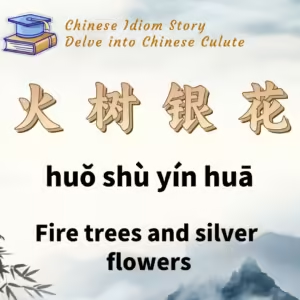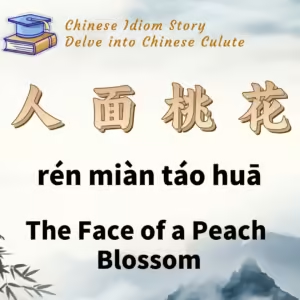
Chinese Idiom: 悲欢离合 (Bei Huan Li He)
English Translation: Sorrow and Joy, Separation and Reunion
pīn yīn: bēi huān lí hé
Idiom Meaning: It metaphorically describes the various emotions and experiences of life.
Historical Source: From Su Shi’s poem Shui Diao Ge Tou (Water Melody) written during the Northern Song Dynasty.
Idiom Story:
According to tradition, the 15th day of the eighth lunar month, known as the Mid-Autumn Festival, is a time for moon-gazing and family reunions. On the night of the Mid-Autumn Festival in 1076 AD, Su Shi, then serving as the governor of Mizhou (now in Shandong Province), was at odds with Wang Anshi’s reform policies. On this occasion, he celebrated by drinking wine and composing poetry while admiring the moon until dawn.
In the middle of the night, he found himself reminiscing about his brother, Su Zhe (styled Zi You), whom he had not seen for many years. This prompted him to write a poem reflecting on the bittersweet nature of life and familial bonds. The poem opens with his thoughts on moonlight, gradually shifting focus to his brother. The original lines of the poem include:
“When will the bright moon appear? Holding my wine, I ask the blue sky. I wonder in the heavenly palace, what year is this evening? I long to ride the wind back home, but fear the jade towers are too cold to endure. I dance and play with my shadow; how is it different from being on Earth?
The moon shifts from the vermilion pavilion to the intricately carved windows, shining on those who cannot sleep. There shouldn’t be any hatred; why is the moon always full when we are apart? People experience joy and sorrow, separation and reunion, just as the moon waxes and wanes. This has been hard to achieve since ancient times. I only wish for longevity, so we can share the beauty of the moon, even if we are a thousand miles apart.”
In summary, the poem expresses Su Shi’s longing for his brother while contemplating the inevitability of life’s ups and downs, as reflected in the changing moon. He reflects on the beauty of life and the bittersweet nature of human emotions. The realization that perfection is unattainable is a central theme; instead, he finds solace in the hope that he and his brother can enjoy the moon’s beauty, no matter the distance between them.
Over time, the phrase “人有悲欢离合” (people experience joy and sorrow, separation and reunion) was condensed to form the idiom “悲欢离合,” which encapsulates the essence of human experiences and emotions.






